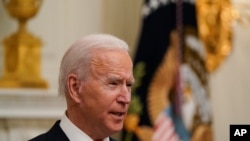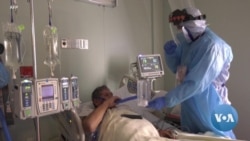U.S. President Joe Biden spent his first full day in office Thursday signing a number of executive orders addressing the handling of the coronavirus pandemic, which has affected more people in the United States than anyplace else in the world. The U.S. has 24.6 million of the world’s more than 97 million infections.
One of Biden’s orders would increase production of a syringe that pharmacists have discovered allows them to extract an extra dose of the vaccine from vials.
The establishment of the Pandemic Testing Board is the result of another executive order. The aim of the new board is to increase COVID testing. Many Americans are still scrambling to secure testing appointments.
Another of Biden’s executive orders mandates the wearing of masks on intercity buses and trains, as well as in airports and on airplanes. Mask-wearing has been identified as a simple, but effective means of slowing the spread of the virus.
In other news on Biden’s first full day in office, the country’s leading infectious disease expert said the United States will participate in the global initiative to provide COVID-19 vaccines to poor countries.
Dr. Anthony Fauci, the head of the National Institute of Allergy and Infectious Diseases and Biden’s chief medical adviser, told the executive board of the World Health Organization Thursday during a videoconference that the United States will join the COVID-19 Vaccines Global Access Facility, or COVAX, an international alliance led by WHO that seeks to provide COVID vaccines to the world’s poorest countries.
Fauci also said the U.S. would fulfill its financial obligations to the United Nations health agency and maintain its previous staffing commitments. His remarks came one day after Biden issued an order on his first day in office pledging to restore Washington’s ties with WHO. Former President Donald Trump announced in May that he was withdrawing the United States from the WHO, accusing the agency of helping China cover up the extent of the coronavirus, which was first detected in the central city of Wuhan in late 2019.
“This is a good day for WHO and a good day for global health,” said WHO Director-General Tedros Adhanom Ghebreyesus in response to Fauci’s announcement.
In a related story, Reuters news agency says the COVAX initiative announced Thursday that it is aiming to deliver 1.8 billion doses of COVID-19 vaccine to poor countries in 2021, and hopes to fulfill supply deals for wealthier ones in the second half of the year.
The world is racing against time to produce and deliver billions of doses of new coronavirus vaccines to blunt the pandemic, which has killed over 2 million people out of a total of over 97 million confirmed COVID-19 infections, according to Johns Hopkins Coronavirus Resource Center.
Vaccination efforts have run into numerous difficulties, however, including logistical hurdles, bureaucratic failures and a basic shortage of vaccines, which has led to residents across the U.S. having had their vaccine appointments canceled.
In Peru, a group of doctors launched a hunger strike this week to protest the government’s lack of preparation for a second wave of COVID-19 cases.
Dr. Teodoro Quiñones, the secretary-general of Peru’s physician’s union who is taking part in the strike, and at least a half-dozen striking doctors are staging the strike in a makeshift tent outside the headquarters of the health ministry in the capital, Lima.
Quiñones said the government has not fulfilled its commitments to improve conditions in the country’s public hospital system, leaving doctors without adequate supplies of oxygen, medicines and ventilators. He told The New York Times the state-run EsSalud network dismissed COVID-19 specialists after the first wave receded and failed to hire them back when more and more new cases began filling up hospital intensive care units.
The South American country has more than a million confirmed coronavirus infections, including over 39,000 deaths, according to Johns Hopkins.







